Delegation Skills in Nursing: Analysis and Strategies for Practice
VerifiedAdded on 2022/10/02
|8
|2647
|82
Essay
AI Summary
This essay delves into the critical role of delegation skills in nursing, emphasizing the responsibilities of Registered Nurses (RNs) in patient care. It explores the significance of delegation in healthcare practices, highlighting the importance of sophisticated clinical judgments and accountability. The essay discusses various programs and assessments, such as the Work Complexity Assessment, designed to equip nurses with the necessary skills for effective delegation. It examines the relationship between RNs, LPNs, and other healthcare staff, emphasizing the need for collaboration, communication, and trust. The analysis covers unit-based, pairing, and partnering approaches to delegation, as well as the strategies RNs can adopt to ensure quality patient care. The essay concludes by underscoring the complex nature of delegation and its direct impact on patient outcomes, advocating for ongoing development and training in this crucial area of nursing practice.
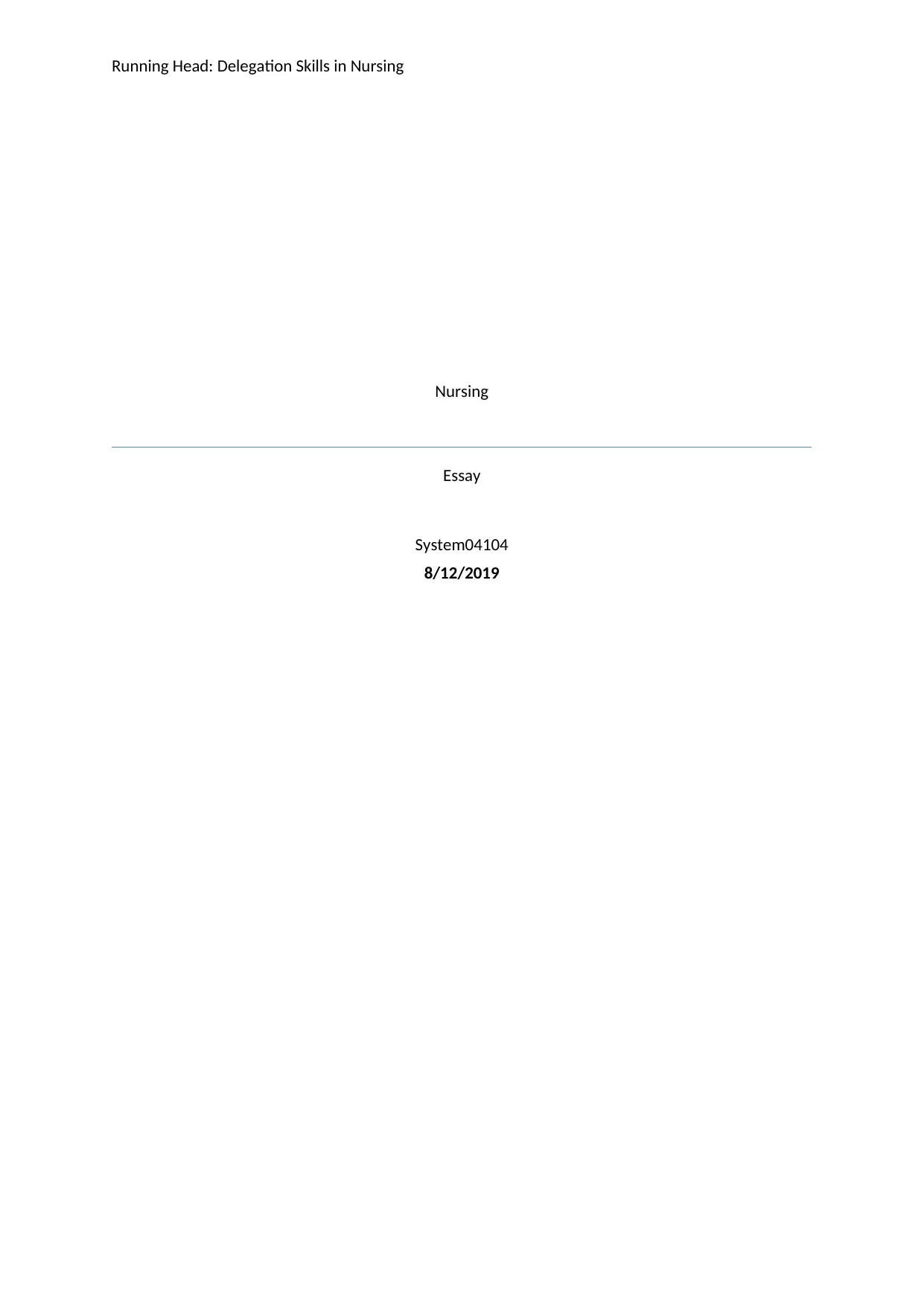
Running Head: Delegation Skills in Nursing
Nursing
Essay
System04104
8/12/2019
Nursing
Essay
System04104
8/12/2019
Paraphrase This Document
Need a fresh take? Get an instant paraphrase of this document with our AI Paraphraser
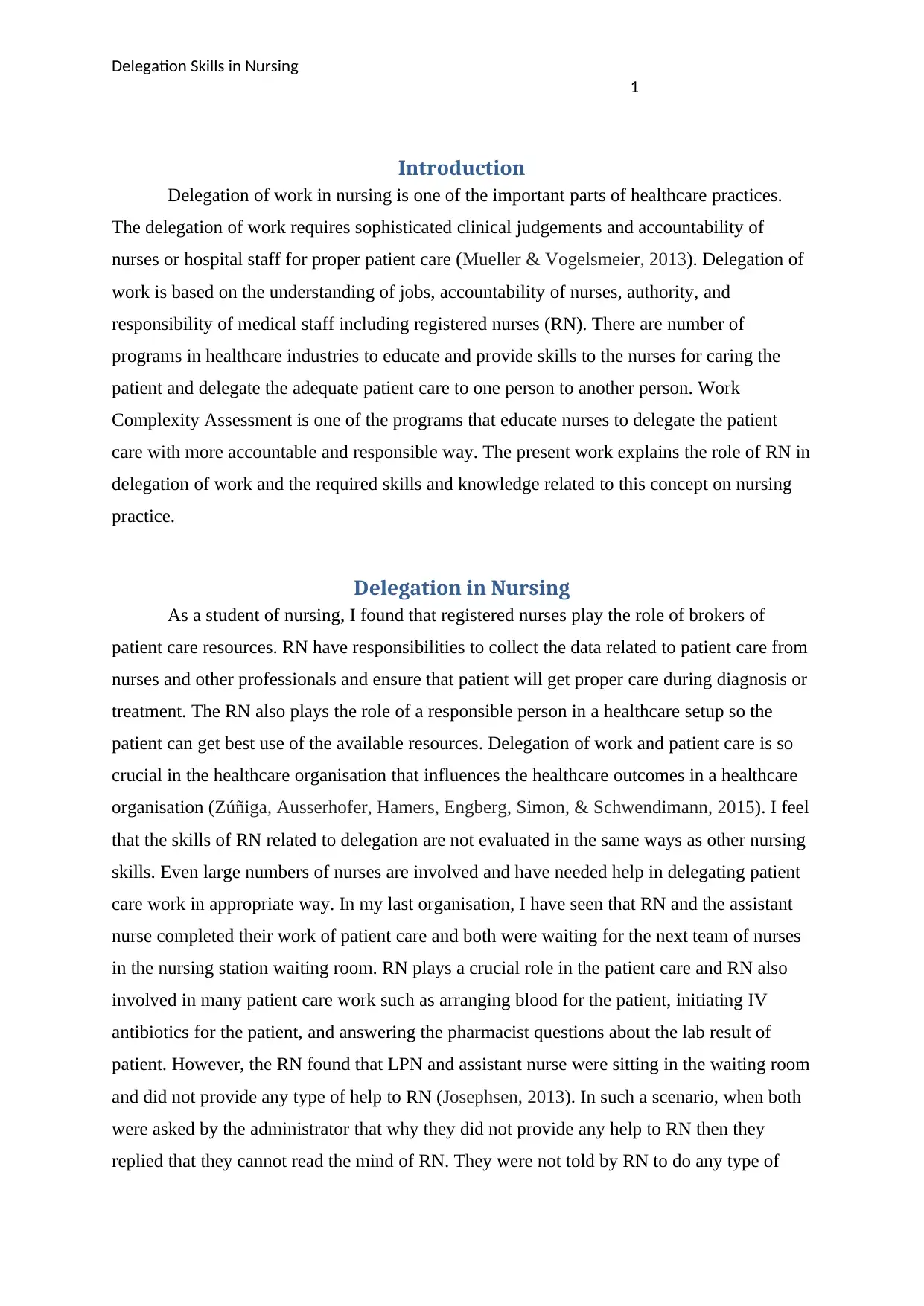
Delegation Skills in Nursing
1
Introduction
Delegation of work in nursing is one of the important parts of healthcare practices.
The delegation of work requires sophisticated clinical judgements and accountability of
nurses or hospital staff for proper patient care (Mueller & Vogelsmeier, 2013). Delegation of
work is based on the understanding of jobs, accountability of nurses, authority, and
responsibility of medical staff including registered nurses (RN). There are number of
programs in healthcare industries to educate and provide skills to the nurses for caring the
patient and delegate the adequate patient care to one person to another person. Work
Complexity Assessment is one of the programs that educate nurses to delegate the patient
care with more accountable and responsible way. The present work explains the role of RN in
delegation of work and the required skills and knowledge related to this concept on nursing
practice.
Delegation in Nursing
As a student of nursing, I found that registered nurses play the role of brokers of
patient care resources. RN have responsibilities to collect the data related to patient care from
nurses and other professionals and ensure that patient will get proper care during diagnosis or
treatment. The RN also plays the role of a responsible person in a healthcare setup so the
patient can get best use of the available resources. Delegation of work and patient care is so
crucial in the healthcare organisation that influences the healthcare outcomes in a healthcare
organisation (Zúñiga, Ausserhofer, Hamers, Engberg, Simon, & Schwendimann, 2015). I feel
that the skills of RN related to delegation are not evaluated in the same ways as other nursing
skills. Even large numbers of nurses are involved and have needed help in delegating patient
care work in appropriate way. In my last organisation, I have seen that RN and the assistant
nurse completed their work of patient care and both were waiting for the next team of nurses
in the nursing station waiting room. RN plays a crucial role in the patient care and RN also
involved in many patient care work such as arranging blood for the patient, initiating IV
antibiotics for the patient, and answering the pharmacist questions about the lab result of
patient. However, the RN found that LPN and assistant nurse were sitting in the waiting room
and did not provide any type of help to RN (Josephsen, 2013). In such a scenario, when both
were asked by the administrator that why they did not provide any help to RN then they
replied that they cannot read the mind of RN. They were not told by RN to do any type of
1
Introduction
Delegation of work in nursing is one of the important parts of healthcare practices.
The delegation of work requires sophisticated clinical judgements and accountability of
nurses or hospital staff for proper patient care (Mueller & Vogelsmeier, 2013). Delegation of
work is based on the understanding of jobs, accountability of nurses, authority, and
responsibility of medical staff including registered nurses (RN). There are number of
programs in healthcare industries to educate and provide skills to the nurses for caring the
patient and delegate the adequate patient care to one person to another person. Work
Complexity Assessment is one of the programs that educate nurses to delegate the patient
care with more accountable and responsible way. The present work explains the role of RN in
delegation of work and the required skills and knowledge related to this concept on nursing
practice.
Delegation in Nursing
As a student of nursing, I found that registered nurses play the role of brokers of
patient care resources. RN have responsibilities to collect the data related to patient care from
nurses and other professionals and ensure that patient will get proper care during diagnosis or
treatment. The RN also plays the role of a responsible person in a healthcare setup so the
patient can get best use of the available resources. Delegation of work and patient care is so
crucial in the healthcare organisation that influences the healthcare outcomes in a healthcare
organisation (Zúñiga, Ausserhofer, Hamers, Engberg, Simon, & Schwendimann, 2015). I feel
that the skills of RN related to delegation are not evaluated in the same ways as other nursing
skills. Even large numbers of nurses are involved and have needed help in delegating patient
care work in appropriate way. In my last organisation, I have seen that RN and the assistant
nurse completed their work of patient care and both were waiting for the next team of nurses
in the nursing station waiting room. RN plays a crucial role in the patient care and RN also
involved in many patient care work such as arranging blood for the patient, initiating IV
antibiotics for the patient, and answering the pharmacist questions about the lab result of
patient. However, the RN found that LPN and assistant nurse were sitting in the waiting room
and did not provide any type of help to RN (Josephsen, 2013). In such a scenario, when both
were asked by the administrator that why they did not provide any help to RN then they
replied that they cannot read the mind of RN. They were not told by RN to do any type of
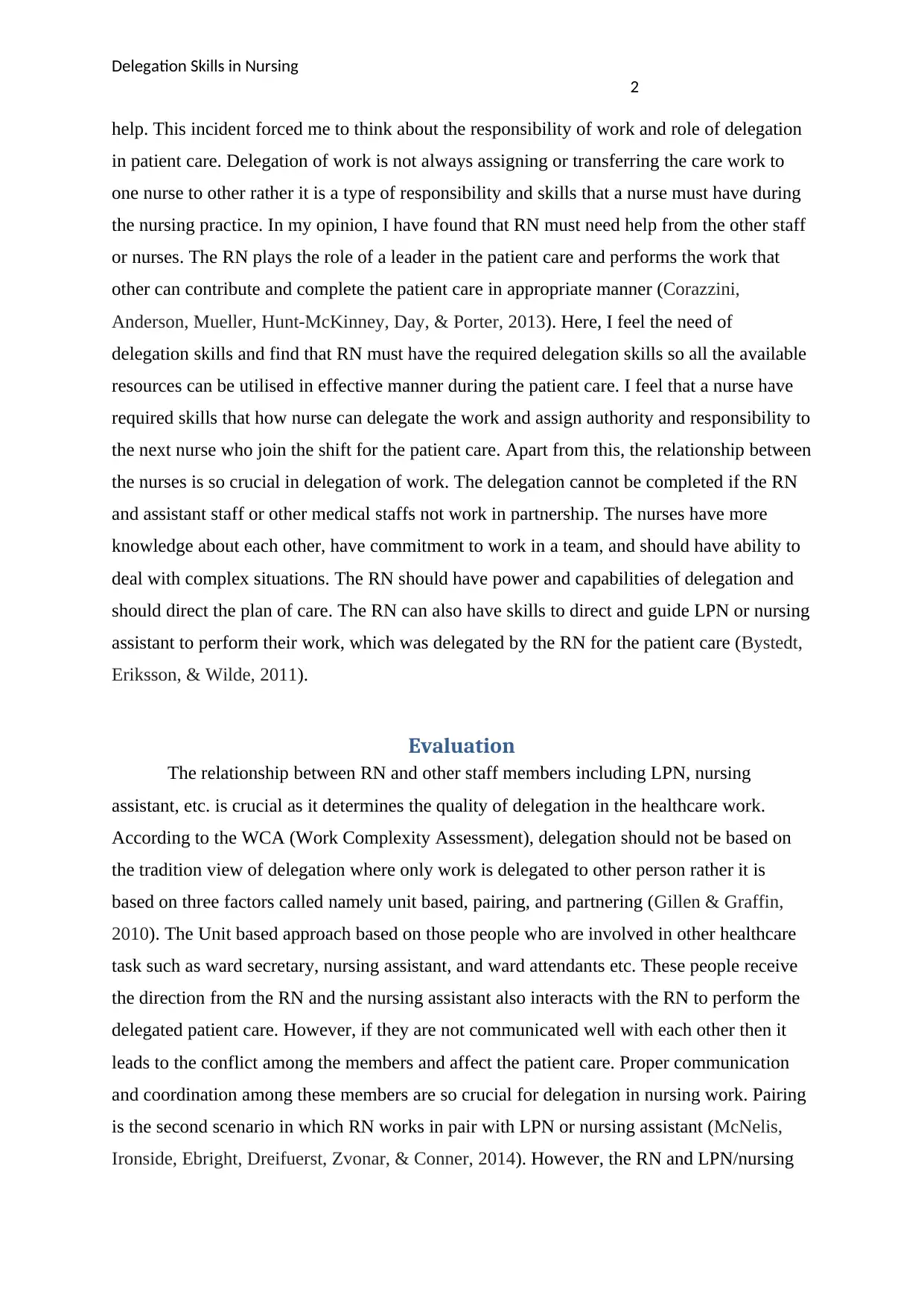
Delegation Skills in Nursing
2
help. This incident forced me to think about the responsibility of work and role of delegation
in patient care. Delegation of work is not always assigning or transferring the care work to
one nurse to other rather it is a type of responsibility and skills that a nurse must have during
the nursing practice. In my opinion, I have found that RN must need help from the other staff
or nurses. The RN plays the role of a leader in the patient care and performs the work that
other can contribute and complete the patient care in appropriate manner (Corazzini,
Anderson, Mueller, Hunt-McKinney, Day, & Porter, 2013). Here, I feel the need of
delegation skills and find that RN must have the required delegation skills so all the available
resources can be utilised in effective manner during the patient care. I feel that a nurse have
required skills that how nurse can delegate the work and assign authority and responsibility to
the next nurse who join the shift for the patient care. Apart from this, the relationship between
the nurses is so crucial in delegation of work. The delegation cannot be completed if the RN
and assistant staff or other medical staffs not work in partnership. The nurses have more
knowledge about each other, have commitment to work in a team, and should have ability to
deal with complex situations. The RN should have power and capabilities of delegation and
should direct the plan of care. The RN can also have skills to direct and guide LPN or nursing
assistant to perform their work, which was delegated by the RN for the patient care (Bystedt,
Eriksson, & Wilde, 2011).
Evaluation
The relationship between RN and other staff members including LPN, nursing
assistant, etc. is crucial as it determines the quality of delegation in the healthcare work.
According to the WCA (Work Complexity Assessment), delegation should not be based on
the tradition view of delegation where only work is delegated to other person rather it is
based on three factors called namely unit based, pairing, and partnering (Gillen & Graffin,
2010). The Unit based approach based on those people who are involved in other healthcare
task such as ward secretary, nursing assistant, and ward attendants etc. These people receive
the direction from the RN and the nursing assistant also interacts with the RN to perform the
delegated patient care. However, if they are not communicated well with each other then it
leads to the conflict among the members and affect the patient care. Proper communication
and coordination among these members are so crucial for delegation in nursing work. Pairing
is the second scenario in which RN works in pair with LPN or nursing assistant (McNelis,
Ironside, Ebright, Dreifuerst, Zvonar, & Conner, 2014). However, the RN and LPN/nursing
2
help. This incident forced me to think about the responsibility of work and role of delegation
in patient care. Delegation of work is not always assigning or transferring the care work to
one nurse to other rather it is a type of responsibility and skills that a nurse must have during
the nursing practice. In my opinion, I have found that RN must need help from the other staff
or nurses. The RN plays the role of a leader in the patient care and performs the work that
other can contribute and complete the patient care in appropriate manner (Corazzini,
Anderson, Mueller, Hunt-McKinney, Day, & Porter, 2013). Here, I feel the need of
delegation skills and find that RN must have the required delegation skills so all the available
resources can be utilised in effective manner during the patient care. I feel that a nurse have
required skills that how nurse can delegate the work and assign authority and responsibility to
the next nurse who join the shift for the patient care. Apart from this, the relationship between
the nurses is so crucial in delegation of work. The delegation cannot be completed if the RN
and assistant staff or other medical staffs not work in partnership. The nurses have more
knowledge about each other, have commitment to work in a team, and should have ability to
deal with complex situations. The RN should have power and capabilities of delegation and
should direct the plan of care. The RN can also have skills to direct and guide LPN or nursing
assistant to perform their work, which was delegated by the RN for the patient care (Bystedt,
Eriksson, & Wilde, 2011).
Evaluation
The relationship between RN and other staff members including LPN, nursing
assistant, etc. is crucial as it determines the quality of delegation in the healthcare work.
According to the WCA (Work Complexity Assessment), delegation should not be based on
the tradition view of delegation where only work is delegated to other person rather it is
based on three factors called namely unit based, pairing, and partnering (Gillen & Graffin,
2010). The Unit based approach based on those people who are involved in other healthcare
task such as ward secretary, nursing assistant, and ward attendants etc. These people receive
the direction from the RN and the nursing assistant also interacts with the RN to perform the
delegated patient care. However, if they are not communicated well with each other then it
leads to the conflict among the members and affect the patient care. Proper communication
and coordination among these members are so crucial for delegation in nursing work. Pairing
is the second scenario in which RN works in pair with LPN or nursing assistant (McNelis,
Ironside, Ebright, Dreifuerst, Zvonar, & Conner, 2014). However, the RN and LPN/nursing
⊘ This is a preview!⊘
Do you want full access?
Subscribe today to unlock all pages.

Trusted by 1+ million students worldwide
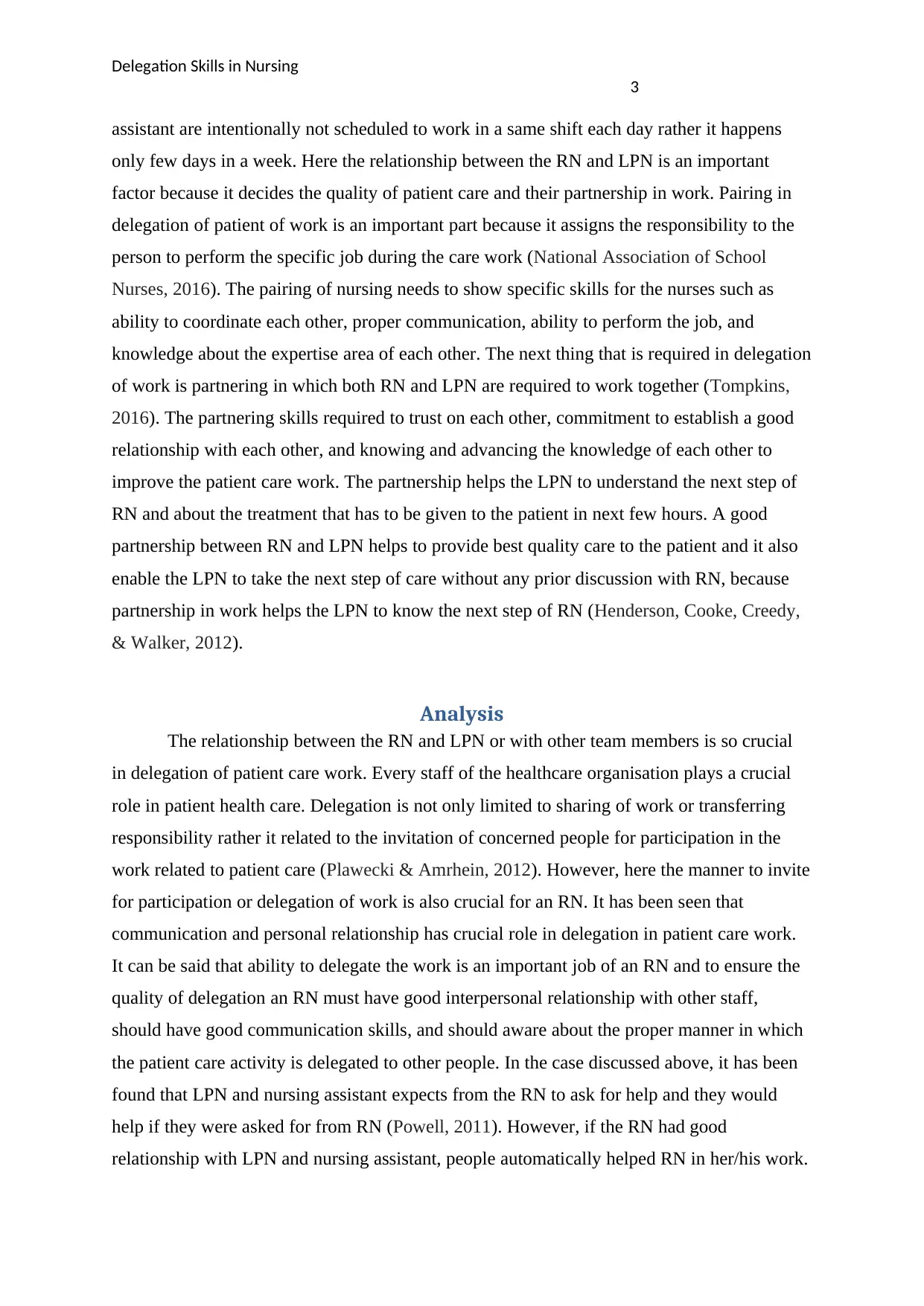
Delegation Skills in Nursing
3
assistant are intentionally not scheduled to work in a same shift each day rather it happens
only few days in a week. Here the relationship between the RN and LPN is an important
factor because it decides the quality of patient care and their partnership in work. Pairing in
delegation of patient of work is an important part because it assigns the responsibility to the
person to perform the specific job during the care work (National Association of School
Nurses, 2016). The pairing of nursing needs to show specific skills for the nurses such as
ability to coordinate each other, proper communication, ability to perform the job, and
knowledge about the expertise area of each other. The next thing that is required in delegation
of work is partnering in which both RN and LPN are required to work together (Tompkins,
2016). The partnering skills required to trust on each other, commitment to establish a good
relationship with each other, and knowing and advancing the knowledge of each other to
improve the patient care work. The partnership helps the LPN to understand the next step of
RN and about the treatment that has to be given to the patient in next few hours. A good
partnership between RN and LPN helps to provide best quality care to the patient and it also
enable the LPN to take the next step of care without any prior discussion with RN, because
partnership in work helps the LPN to know the next step of RN (Henderson, Cooke, Creedy,
& Walker, 2012).
Analysis
The relationship between the RN and LPN or with other team members is so crucial
in delegation of patient care work. Every staff of the healthcare organisation plays a crucial
role in patient health care. Delegation is not only limited to sharing of work or transferring
responsibility rather it related to the invitation of concerned people for participation in the
work related to patient care (Plawecki & Amrhein, 2012). However, here the manner to invite
for participation or delegation of work is also crucial for an RN. It has been seen that
communication and personal relationship has crucial role in delegation in patient care work.
It can be said that ability to delegate the work is an important job of an RN and to ensure the
quality of delegation an RN must have good interpersonal relationship with other staff,
should have good communication skills, and should aware about the proper manner in which
the patient care activity is delegated to other people. In the case discussed above, it has been
found that LPN and nursing assistant expects from the RN to ask for help and they would
help if they were asked for from RN (Powell, 2011). However, if the RN had good
relationship with LPN and nursing assistant, people automatically helped RN in her/his work.
3
assistant are intentionally not scheduled to work in a same shift each day rather it happens
only few days in a week. Here the relationship between the RN and LPN is an important
factor because it decides the quality of patient care and their partnership in work. Pairing in
delegation of patient of work is an important part because it assigns the responsibility to the
person to perform the specific job during the care work (National Association of School
Nurses, 2016). The pairing of nursing needs to show specific skills for the nurses such as
ability to coordinate each other, proper communication, ability to perform the job, and
knowledge about the expertise area of each other. The next thing that is required in delegation
of work is partnering in which both RN and LPN are required to work together (Tompkins,
2016). The partnering skills required to trust on each other, commitment to establish a good
relationship with each other, and knowing and advancing the knowledge of each other to
improve the patient care work. The partnership helps the LPN to understand the next step of
RN and about the treatment that has to be given to the patient in next few hours. A good
partnership between RN and LPN helps to provide best quality care to the patient and it also
enable the LPN to take the next step of care without any prior discussion with RN, because
partnership in work helps the LPN to know the next step of RN (Henderson, Cooke, Creedy,
& Walker, 2012).
Analysis
The relationship between the RN and LPN or with other team members is so crucial
in delegation of patient care work. Every staff of the healthcare organisation plays a crucial
role in patient health care. Delegation is not only limited to sharing of work or transferring
responsibility rather it related to the invitation of concerned people for participation in the
work related to patient care (Plawecki & Amrhein, 2012). However, here the manner to invite
for participation or delegation of work is also crucial for an RN. It has been seen that
communication and personal relationship has crucial role in delegation in patient care work.
It can be said that ability to delegate the work is an important job of an RN and to ensure the
quality of delegation an RN must have good interpersonal relationship with other staff,
should have good communication skills, and should aware about the proper manner in which
the patient care activity is delegated to other people. In the case discussed above, it has been
found that LPN and nursing assistant expects from the RN to ask for help and they would
help if they were asked for from RN (Powell, 2011). However, if the RN had good
relationship with LPN and nursing assistant, people automatically helped RN in her/his work.
Paraphrase This Document
Need a fresh take? Get an instant paraphrase of this document with our AI Paraphraser
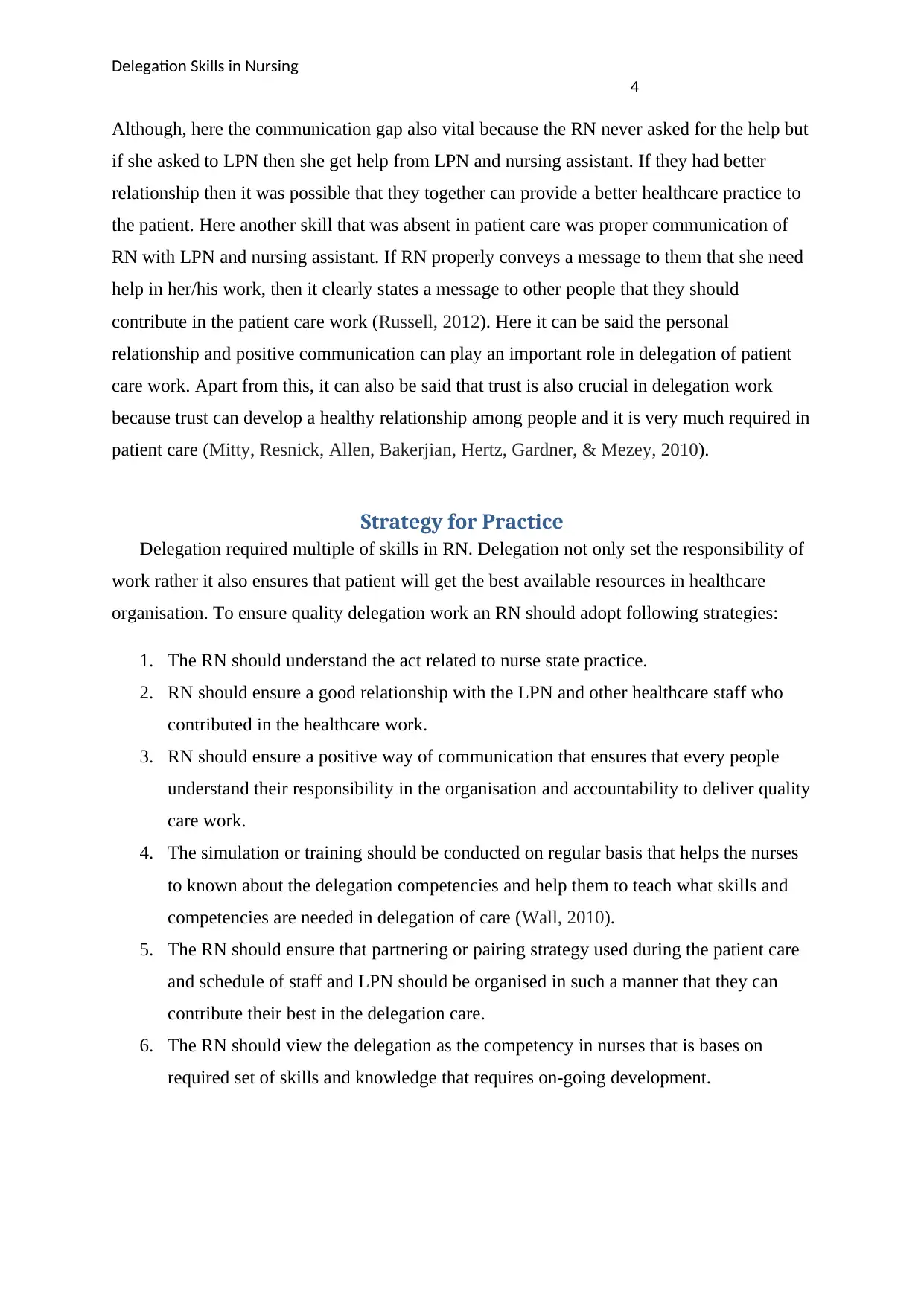
Delegation Skills in Nursing
4
Although, here the communication gap also vital because the RN never asked for the help but
if she asked to LPN then she get help from LPN and nursing assistant. If they had better
relationship then it was possible that they together can provide a better healthcare practice to
the patient. Here another skill that was absent in patient care was proper communication of
RN with LPN and nursing assistant. If RN properly conveys a message to them that she need
help in her/his work, then it clearly states a message to other people that they should
contribute in the patient care work (Russell, 2012). Here it can be said the personal
relationship and positive communication can play an important role in delegation of patient
care work. Apart from this, it can also be said that trust is also crucial in delegation work
because trust can develop a healthy relationship among people and it is very much required in
patient care (Mitty, Resnick, Allen, Bakerjian, Hertz, Gardner, & Mezey, 2010).
Strategy for Practice
Delegation required multiple of skills in RN. Delegation not only set the responsibility of
work rather it also ensures that patient will get the best available resources in healthcare
organisation. To ensure quality delegation work an RN should adopt following strategies:
1. The RN should understand the act related to nurse state practice.
2. RN should ensure a good relationship with the LPN and other healthcare staff who
contributed in the healthcare work.
3. RN should ensure a positive way of communication that ensures that every people
understand their responsibility in the organisation and accountability to deliver quality
care work.
4. The simulation or training should be conducted on regular basis that helps the nurses
to known about the delegation competencies and help them to teach what skills and
competencies are needed in delegation of care (Wall, 2010).
5. The RN should ensure that partnering or pairing strategy used during the patient care
and schedule of staff and LPN should be organised in such a manner that they can
contribute their best in the delegation care.
6. The RN should view the delegation as the competency in nurses that is bases on
required set of skills and knowledge that requires on-going development.
4
Although, here the communication gap also vital because the RN never asked for the help but
if she asked to LPN then she get help from LPN and nursing assistant. If they had better
relationship then it was possible that they together can provide a better healthcare practice to
the patient. Here another skill that was absent in patient care was proper communication of
RN with LPN and nursing assistant. If RN properly conveys a message to them that she need
help in her/his work, then it clearly states a message to other people that they should
contribute in the patient care work (Russell, 2012). Here it can be said the personal
relationship and positive communication can play an important role in delegation of patient
care work. Apart from this, it can also be said that trust is also crucial in delegation work
because trust can develop a healthy relationship among people and it is very much required in
patient care (Mitty, Resnick, Allen, Bakerjian, Hertz, Gardner, & Mezey, 2010).
Strategy for Practice
Delegation required multiple of skills in RN. Delegation not only set the responsibility of
work rather it also ensures that patient will get the best available resources in healthcare
organisation. To ensure quality delegation work an RN should adopt following strategies:
1. The RN should understand the act related to nurse state practice.
2. RN should ensure a good relationship with the LPN and other healthcare staff who
contributed in the healthcare work.
3. RN should ensure a positive way of communication that ensures that every people
understand their responsibility in the organisation and accountability to deliver quality
care work.
4. The simulation or training should be conducted on regular basis that helps the nurses
to known about the delegation competencies and help them to teach what skills and
competencies are needed in delegation of care (Wall, 2010).
5. The RN should ensure that partnering or pairing strategy used during the patient care
and schedule of staff and LPN should be organised in such a manner that they can
contribute their best in the delegation care.
6. The RN should view the delegation as the competency in nurses that is bases on
required set of skills and knowledge that requires on-going development.
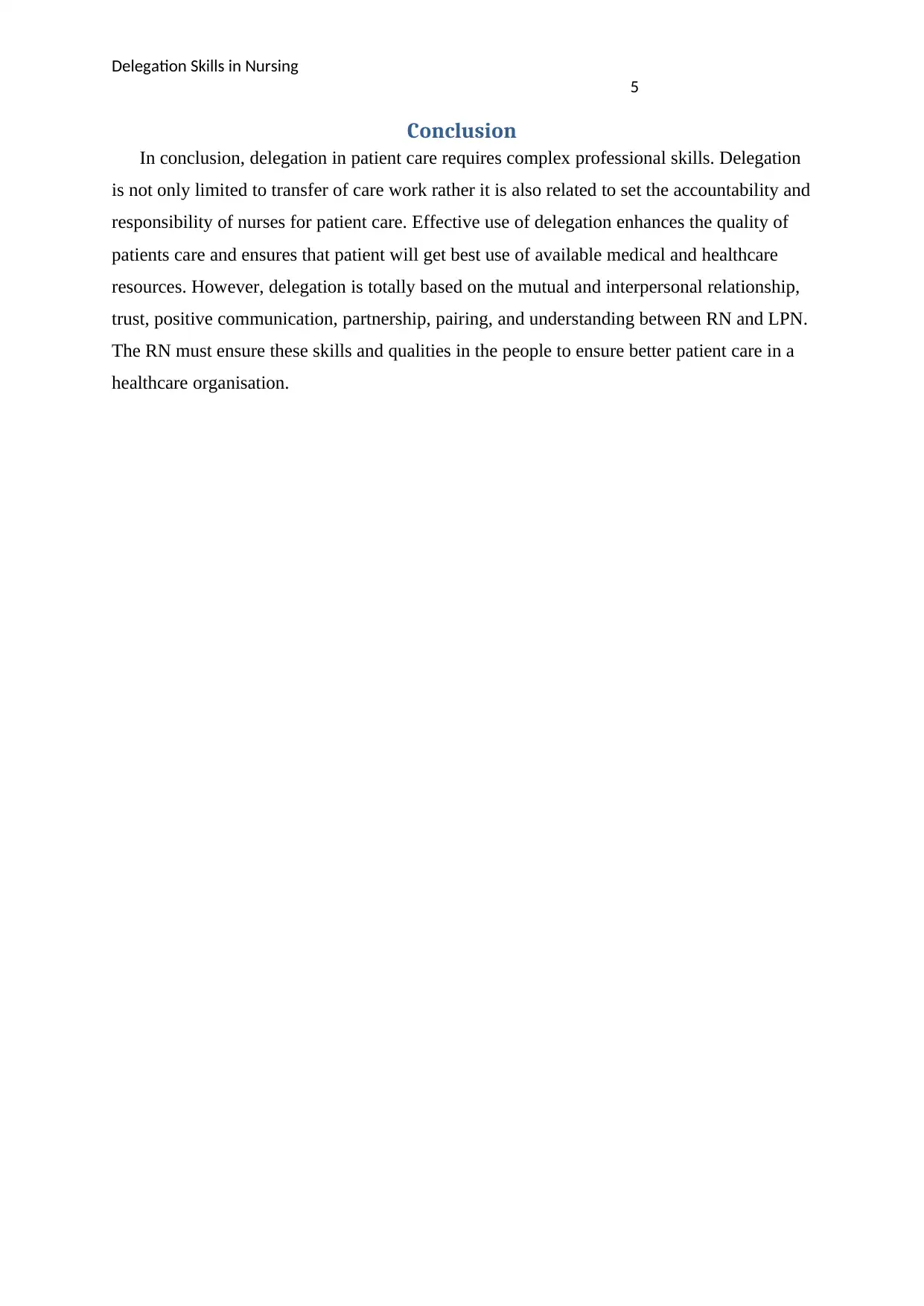
Delegation Skills in Nursing
5
Conclusion
In conclusion, delegation in patient care requires complex professional skills. Delegation
is not only limited to transfer of care work rather it is also related to set the accountability and
responsibility of nurses for patient care. Effective use of delegation enhances the quality of
patients care and ensures that patient will get best use of available medical and healthcare
resources. However, delegation is totally based on the mutual and interpersonal relationship,
trust, positive communication, partnership, pairing, and understanding between RN and LPN.
The RN must ensure these skills and qualities in the people to ensure better patient care in a
healthcare organisation.
5
Conclusion
In conclusion, delegation in patient care requires complex professional skills. Delegation
is not only limited to transfer of care work rather it is also related to set the accountability and
responsibility of nurses for patient care. Effective use of delegation enhances the quality of
patients care and ensures that patient will get best use of available medical and healthcare
resources. However, delegation is totally based on the mutual and interpersonal relationship,
trust, positive communication, partnership, pairing, and understanding between RN and LPN.
The RN must ensure these skills and qualities in the people to ensure better patient care in a
healthcare organisation.
⊘ This is a preview!⊘
Do you want full access?
Subscribe today to unlock all pages.

Trusted by 1+ million students worldwide
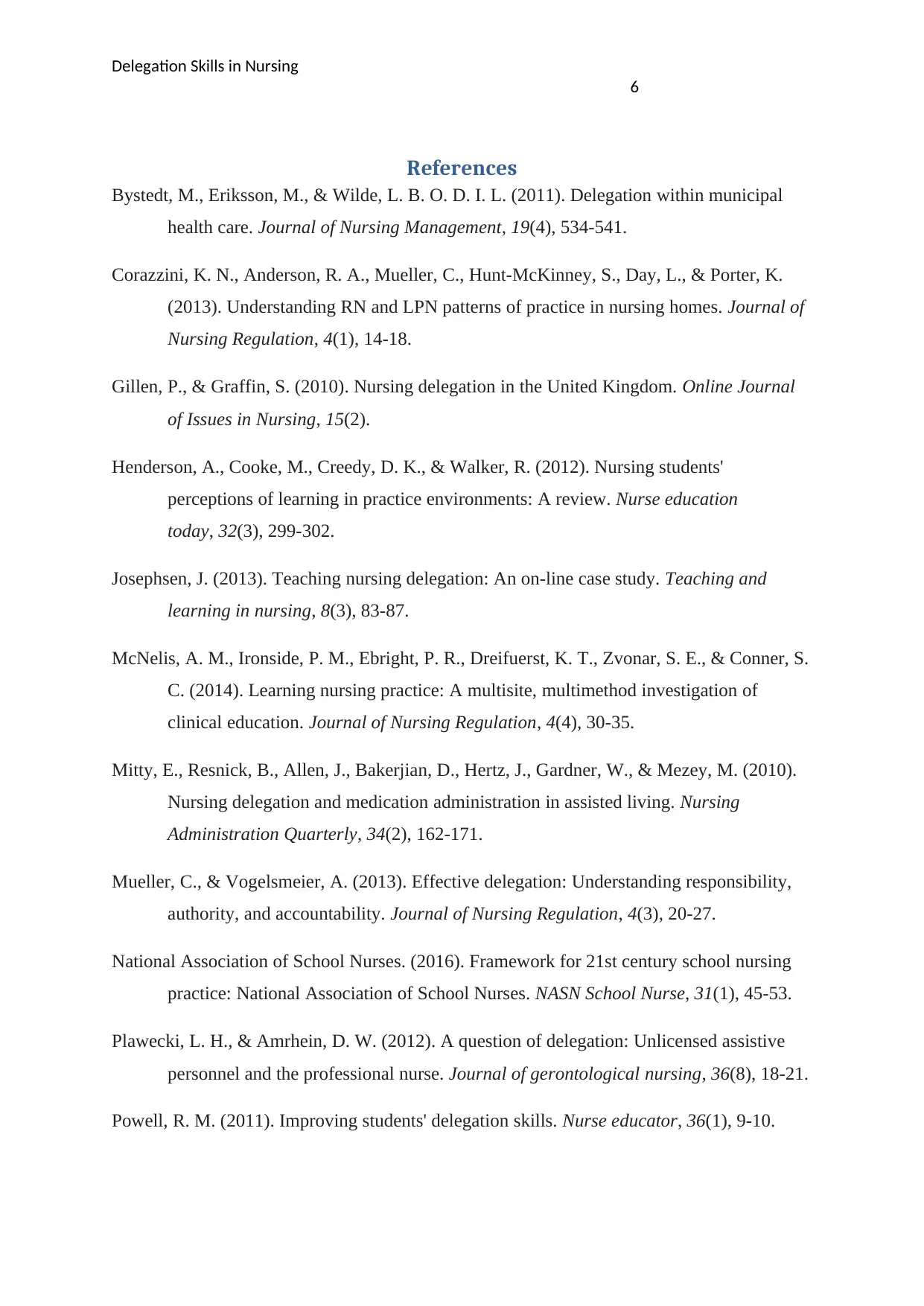
Delegation Skills in Nursing
6
References
Bystedt, M., Eriksson, M., & Wilde, L. B. O. D. I. L. (2011). Delegation within municipal
health care. Journal of Nursing Management, 19(4), 534-541.
Corazzini, K. N., Anderson, R. A., Mueller, C., Hunt-McKinney, S., Day, L., & Porter, K.
(2013). Understanding RN and LPN patterns of practice in nursing homes. Journal of
Nursing Regulation, 4(1), 14-18.
Gillen, P., & Graffin, S. (2010). Nursing delegation in the United Kingdom. Online Journal
of Issues in Nursing, 15(2).
Henderson, A., Cooke, M., Creedy, D. K., & Walker, R. (2012). Nursing students'
perceptions of learning in practice environments: A review. Nurse education
today, 32(3), 299-302.
Josephsen, J. (2013). Teaching nursing delegation: An on-line case study. Teaching and
learning in nursing, 8(3), 83-87.
McNelis, A. M., Ironside, P. M., Ebright, P. R., Dreifuerst, K. T., Zvonar, S. E., & Conner, S.
C. (2014). Learning nursing practice: A multisite, multimethod investigation of
clinical education. Journal of Nursing Regulation, 4(4), 30-35.
Mitty, E., Resnick, B., Allen, J., Bakerjian, D., Hertz, J., Gardner, W., & Mezey, M. (2010).
Nursing delegation and medication administration in assisted living. Nursing
Administration Quarterly, 34(2), 162-171.
Mueller, C., & Vogelsmeier, A. (2013). Effective delegation: Understanding responsibility,
authority, and accountability. Journal of Nursing Regulation, 4(3), 20-27.
National Association of School Nurses. (2016). Framework for 21st century school nursing
practice: National Association of School Nurses. NASN School Nurse, 31(1), 45-53.
Plawecki, L. H., & Amrhein, D. W. (2012). A question of delegation: Unlicensed assistive
personnel and the professional nurse. Journal of gerontological nursing, 36(8), 18-21.
Powell, R. M. (2011). Improving students' delegation skills. Nurse educator, 36(1), 9-10.
6
References
Bystedt, M., Eriksson, M., & Wilde, L. B. O. D. I. L. (2011). Delegation within municipal
health care. Journal of Nursing Management, 19(4), 534-541.
Corazzini, K. N., Anderson, R. A., Mueller, C., Hunt-McKinney, S., Day, L., & Porter, K.
(2013). Understanding RN and LPN patterns of practice in nursing homes. Journal of
Nursing Regulation, 4(1), 14-18.
Gillen, P., & Graffin, S. (2010). Nursing delegation in the United Kingdom. Online Journal
of Issues in Nursing, 15(2).
Henderson, A., Cooke, M., Creedy, D. K., & Walker, R. (2012). Nursing students'
perceptions of learning in practice environments: A review. Nurse education
today, 32(3), 299-302.
Josephsen, J. (2013). Teaching nursing delegation: An on-line case study. Teaching and
learning in nursing, 8(3), 83-87.
McNelis, A. M., Ironside, P. M., Ebright, P. R., Dreifuerst, K. T., Zvonar, S. E., & Conner, S.
C. (2014). Learning nursing practice: A multisite, multimethod investigation of
clinical education. Journal of Nursing Regulation, 4(4), 30-35.
Mitty, E., Resnick, B., Allen, J., Bakerjian, D., Hertz, J., Gardner, W., & Mezey, M. (2010).
Nursing delegation and medication administration in assisted living. Nursing
Administration Quarterly, 34(2), 162-171.
Mueller, C., & Vogelsmeier, A. (2013). Effective delegation: Understanding responsibility,
authority, and accountability. Journal of Nursing Regulation, 4(3), 20-27.
National Association of School Nurses. (2016). Framework for 21st century school nursing
practice: National Association of School Nurses. NASN School Nurse, 31(1), 45-53.
Plawecki, L. H., & Amrhein, D. W. (2012). A question of delegation: Unlicensed assistive
personnel and the professional nurse. Journal of gerontological nursing, 36(8), 18-21.
Powell, R. M. (2011). Improving students' delegation skills. Nurse educator, 36(1), 9-10.
Paraphrase This Document
Need a fresh take? Get an instant paraphrase of this document with our AI Paraphraser
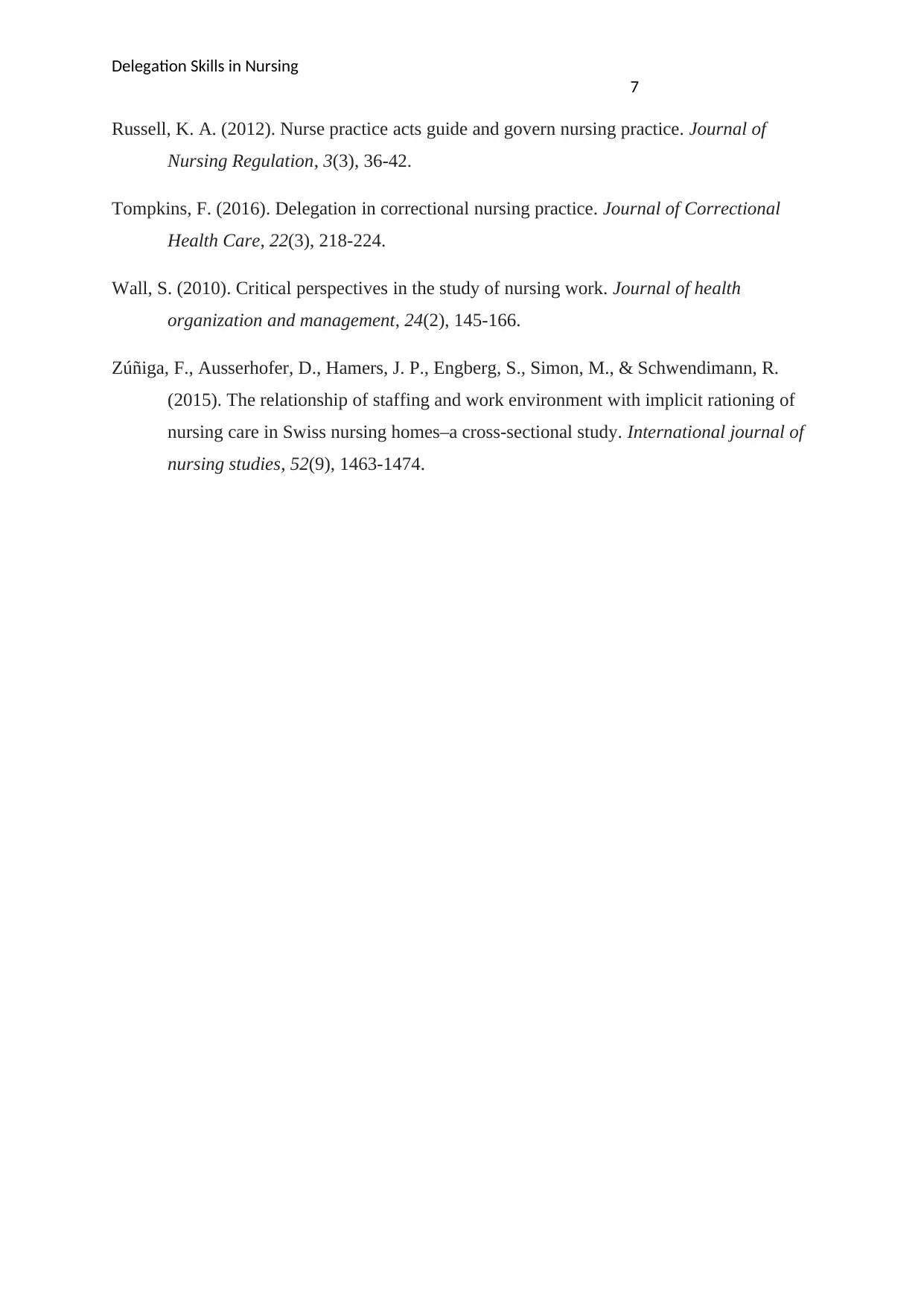
Delegation Skills in Nursing
7
Russell, K. A. (2012). Nurse practice acts guide and govern nursing practice. Journal of
Nursing Regulation, 3(3), 36-42.
Tompkins, F. (2016). Delegation in correctional nursing practice. Journal of Correctional
Health Care, 22(3), 218-224.
Wall, S. (2010). Critical perspectives in the study of nursing work. Journal of health
organization and management, 24(2), 145-166.
Zúñiga, F., Ausserhofer, D., Hamers, J. P., Engberg, S., Simon, M., & Schwendimann, R.
(2015). The relationship of staffing and work environment with implicit rationing of
nursing care in Swiss nursing homes–a cross-sectional study. International journal of
nursing studies, 52(9), 1463-1474.
7
Russell, K. A. (2012). Nurse practice acts guide and govern nursing practice. Journal of
Nursing Regulation, 3(3), 36-42.
Tompkins, F. (2016). Delegation in correctional nursing practice. Journal of Correctional
Health Care, 22(3), 218-224.
Wall, S. (2010). Critical perspectives in the study of nursing work. Journal of health
organization and management, 24(2), 145-166.
Zúñiga, F., Ausserhofer, D., Hamers, J. P., Engberg, S., Simon, M., & Schwendimann, R.
(2015). The relationship of staffing and work environment with implicit rationing of
nursing care in Swiss nursing homes–a cross-sectional study. International journal of
nursing studies, 52(9), 1463-1474.
1 out of 8
Related Documents
Your All-in-One AI-Powered Toolkit for Academic Success.
+13062052269
info@desklib.com
Available 24*7 on WhatsApp / Email
![[object Object]](/_next/static/media/star-bottom.7253800d.svg)
Unlock your academic potential
Copyright © 2020–2025 A2Z Services. All Rights Reserved. Developed and managed by ZUCOL.





